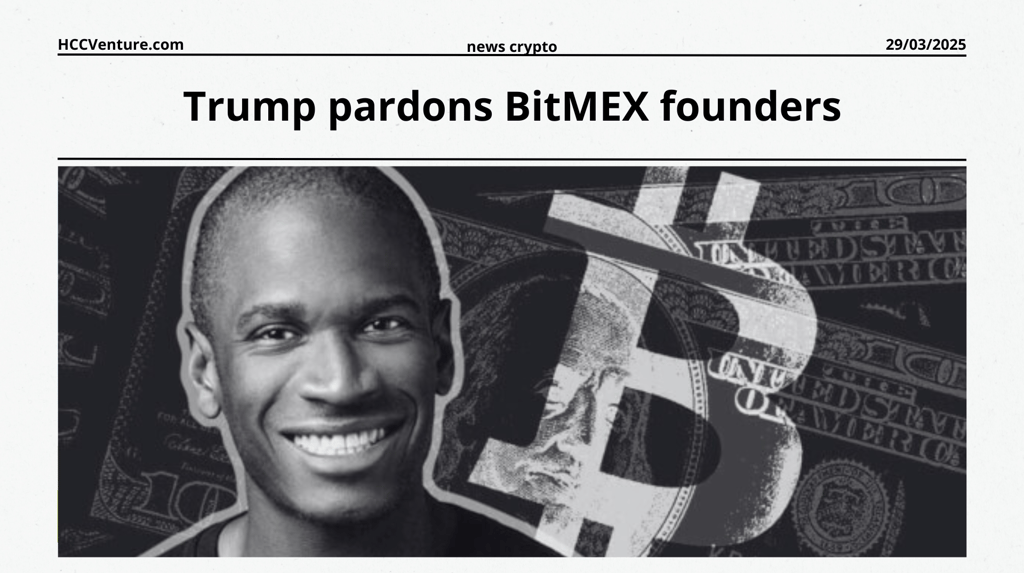Trump Pardons BitMEX Founders – A New Mark in Cryptocurrency Policy
On March 27, 2025, US President Donald Trump made headlines when he signed a pardon for the three founders of the BitMEX cryptocurrency exchange – Arthur Hayes, Benjamin Delo, and Samuel Reed. This is the latest in a series of actions that show Trump’s strong support for the cryptocurrency industry, while also opening up heated debates about the legal future of this field in the US.
3/29/20253 min read


Event Background
BitMEX, which launched in 2014, was once one of the world's leading cryptocurrency derivatives exchanges, known for its highly leveraged futures and perpetual contracts. However, the exchange ran into serious legal trouble in 2020 when the US Commodity Futures Trading Commission (CFTC) and the US Department of Justice (DOJ) accused its three founders of operating an illegal trading platform, violating anti-money laundering (AML) laws and failing to comply with "know your customer" (KYC) regulations. The founders were accused of knowingly allowing US users to trade without registering with the regulator, despite BitMEX claiming it did not serve that market.
After a lengthy investigation, Arthur Hayes and Benjamin Delo pleaded guilty in 2022, were sentenced to probation, and each paid a $10 million fine. Samuel Reed also paid a similar fine but did not serve any prison time. BitMEX, under pressure from the legal system, paid $100 million to settle with the CFTC and made major changes, including implementing a strict KYC policy in 2020. However, the incident still left a negative mark on the reputation of the exchange and its founders.
Trump's pardon, announced on the social media site Truth Social on March 27, 2025, completely erases the sentences and legal precedents for Hayes, Delo and Reed. Trump called it a "just act" to correct what he said was "an injustice from the previous administration."
The meaning of the amnesty decision
The move is not only a personal event for the three BitMEX founders but also has far-reaching implications for the cryptocurrency industry. Previously, in January 2025, Mr. Trump pardoned Ross Ulbricht, the founder of Silk Road, an online black market that used Bitcoin. The continued pardons of major figures in the crypto industry show that Mr. Trump is fulfilling his commitment to making the US "the crypto capital of the world" - a promise made during the 2024 campaign.
The decision also sends a strong message to regulators like the SEC and CFTC, which have often been criticized by the crypto community for their hardline approach. Exchanges like Binance and Coinbase have faced numerous lawsuits under the Biden administration, while BitMEX was one of the first victims of a wave of enforcement. Trump’s pardon appears to be an attempt to erase that hardline legacy and allow crypto businesses to operate more freely in the US.
Community and market response
The crypto community on platforms like X welcomed the decision, seeing it as a sign that the Trump administration will continue to support the nascent but promising industry. Many users said the pardon not only recognizes BitMEX’s role in pioneering crypto derivatives products but also encourages future innovation.
On the market front, BitMEX’s BMEX token saw a significant price increase following the announcement, rising from $0.13 to $0.18 in 24 hours – a gain of more than 38%. This reflects investor optimism about BitMEX’s ability to regain its footing amid a more favorable regulatory environment. However, some caution that the exchange may find it difficult to compete with rivals like Binance or Bybit, which have already surpassed it in terms of trading volume and market coverage.
Legal and political implications
From a legal perspective, Trump’s pardon could ease pressure on other crypto businesses facing litigation in the US. It also sets a precedent that past wrongdoings can be erased if they fit into the administration’s economic development strategy. However, it has also been controversial, with some Democratic lawmakers suggesting that Trump is “favoring” figures with financial ties to him or his family — an unproven claim.
Politically, the event cements Trump’s image as a leader who is friendly to technology and decentralized finance. This is especially important in the context of his policies such as creating a national Bitcoin reserve and developing a stablecoin pegged to the US dollar, in order to compete with countries like China in the financial technology race.
Trump’s pardon of the BitMEX founders is a bold move, but it raises many questions. Is this the start of another wave of pardons for crypto figures like Binance’s Changpeng Zhao? And more importantly, will Trump’s crypto-friendly policies be beneficial in the long run or just a short-term political stunt?
Regardless, the event marks a new chapter in the relationship between the US government and the cryptocurrency industry. With support from the White House, crypto businesses can expect a less restrictive operating environment, but at the same time, they face pressure to prove their true value in the global economy.
Explore HCCVenture group
HCCVenture © 2023. All rights reserved.

Connect with us
Popular content
Contact to us
E-mail : sp_contact@hccventure.com
Register : https://linktr.ee/holdcoincventure
Disclaimer: The information on this website is for informational purposes only and should not be considered investment advice. We are not responsible for any risks or losses arising from investment decisions based on the content here.


TERMS AND CONDITIONS • CUSTOMER PROTECTION POLICY
ANALYTICAL AND NEWS CONTENT IS COMPILED AND PROVIDED BY EXPERTS IN THE FIELD OF DIGITAL FINANCE AND BLOCKCHAIN BELONGING TO HCCVENTURE ORGANIZATION, INCLUDING OWNERSHIP OF THE CONTENT.
RESPONSIBLE FOR MANAGING ALL CONTENT AND ANALYSIS: HCCVENTURE FOUNDER - TRUONG MINH HUY
Read warnings about scams and phishing emails — REPORT A PROBLEM WITH OUR SITE.
